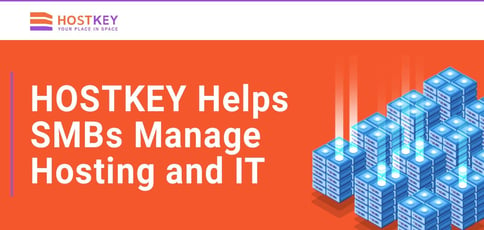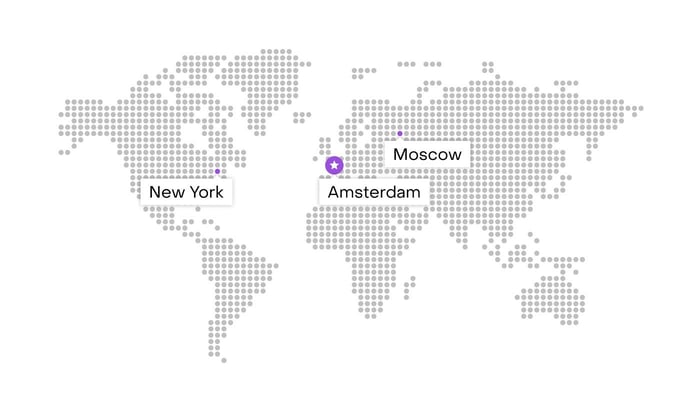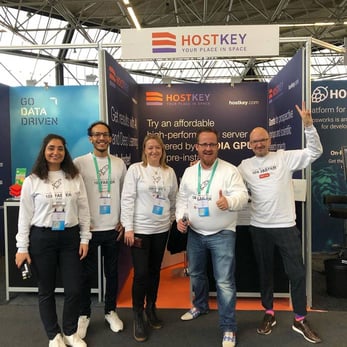
TL; DR: HOSTKEY provides dedicated and cloud hosting services to help SMBs grow and enterprise customers scale. Its offerings include bare metal dedicated servers, GPU-dedicated servers, VPS servers, and private cloud solutions on the server-side. HOSTKEY also offers a range of value-added services, including system installation, administration, and end-to-end lifecycle management of customer IT systems. The host also introduced a remote hands service to help clients delegate IT management and maintenance tasks in datacenters without physical access. This service is especially in demand during COVID-19 pandemic.
The COVID-19 pandemic not only affected most aspects of everyday life, it also threw datacenters into an operational purgatory. Many scrambled to build out capacity and meet the surging needs of locked-down organizations as they rushed to the cloud to keep critical applications running.
Corporations may have scheduled IT expansion over several months pre-pandemic. Now, many need those services in a week. Enterprises that maintained their own datacenters were particularly affected. Overworked IT teams sought to maintain critical systems while dealing with a reduced workforce and unexpected power price hikes.
Hosting services provider HOSTKEY felt the effects of the COVID-19 pandemic more than most. It hosts servers, designs and implements private clouds, and offers a range of value-added support services. The company successfully grew those services before April 2020, but they proved challenging to deliver amid the global health crisis.

Staying on top of the escalating customer demands pushed its engineering team close to its limit, according to HOSTKEY CEO Jeroen de Bie.
“I think I can say without hyperbole that datacenter services were, and continue to be, right in the eye of the pandemic storm, with many challenges converging on our operations at the same time,” said Jeroen. “There has not been a single aspect of HOSTKEY’s operations globally that the coronavirus crisis did not impact.”
Yet there’s no evidence that the growth will slow in a post-pandemic era (whenever that begins). According to Research and Markets, the global datacenter colocation market will grow to $47.02 billion in 2022 (from $39.05 billion in 2020) at a compound annual growth rate CAGR of 20.4%. The market is forecast to be worth $87.73 billion in 2025 ( a CAGR of 16.9%).
And HOSTKEY plans to be a more significant part of the market, too, by continuing to offer the products SMBs and enterprises need now and the service and innovations they will require in the future.
Partnerships Ensure Global Connectivity for Customers
HOSTKEY was founded in 2007 and offers a broad range of dedicated servers, from entry-level to high-performance GPU and private cloud solutions. The Amsterdam-headquartered company owns a fleet of more than 5,000 servers located in Tier 3 datacenters in the US and the Netherlands.
HOSTKEY’s customers are primarily SMBs in Europe, North America, Russia, and Asia, in addition to other private clients. It offers both dedicated and virtual server packages.
“Our clients value our individualized approach, reliability, safety, and the speed of our work,” said Jeroen. “We offer off-the-shelf solutions for a wide range of business needs, as well as custom-made solutions for specific requirements. We are very customer-centric, and the HOSTKEY team is always ready to help, answer questions, and find or develop a suitable solution.”

To ensure high levels of global connectivity, HOSTKEY partners with top telecom operators and internet exchanges, including iAMS-IX, DE-CIX, Hurricane Electric, Level 3 Communications, and Webair.
“On the server-side, our OEM partners include AMD, Dell, Fujitsu, and Gigabyte Technology,” Jeroen said. “Working with them, we can offer the latest equipment, as well as assemble configurations that we believe are unmatched in terms of cost vs. performance.”
HOSTKEY’s solutions portfolio includes DNS hosting, private cloud, VLAN solutions, and storage and data backup options. The company also offers special deals based on specific datacenters.
Leveraging Experience to Meet Faster Time-to-Market Needs
Jeroen believed that HOSTKEY’s market longevity distinguishes it in a crowded hosting services market made even more competitive by the COVID-19 pandemic.
“We learn from our long experience in the datacenter and hosting sector,” Jeroen told us. “However, the pandemic has changed many aspects of the market, and we believe we have entered what we call the post-conventional era in hosting.”
According to Jeroen, the primary differentiator is that the speed of change and innovation has increased dramatically.
“This means that time-to-market requirements get ever-tighter. Increasingly, user-organizations have to form new, on-the-fly approaches toward the creation and development of IT infrastructure,” Jeroen said.

Today, high-performance network access is as essential as provisioning high-performance servers, said Jeroen. The HOSTKEY network connects to key global traffic hubs, which bring high connectivity and low latency to every world region. The company will soon add a 10Gbps uplink to its global network with metered traffic in the Netherlands. And it plans to make incoming traffic free.
Some of the acceleration Jeroen describes might be due, in part, to the difficulties of the COVID-19 pandemic. However, the expansion is making the hosting and hosted services industry an even more rewarding market for everyone.
Comprehensive Service for End-to-End IT Management
Profitability attracts competition, of course, and Fortune Business Insights forecasts the global hosting services market to grow to $267.10 billion in 2028 from $83.99 billion in 2021. That will include new competition that established players, including HOSTKEY, must continue to differentiate from, said Jeroen.
“We realized a long time ago that the market was shifting from just renting computing capacity or server racks to building global networks and comprehensive services that cover a multitude of customer needs,” he said. “HOSTKEY was moving in this direction before, but the pandemic has accelerated our speed of travel considerably.”

As part of that change, HOSTKEY developed a comprehensive service for placing and maintaining customer equipment in the datacenter.
The service also covers the entire life cycle of customer IT infrastructure.
“We offer not only to install customer equipment in the rack in the datacenter and connect it to global carriers but also to choose and buy the equipment,” Jeroen said.
However, moving to that model meant taking on more logistical obligations, including the need to store equipment before customers request it.
“Purchased equipment needs to be stored somewhere and delivered,” said Jeroen. “So warehousing and logistics services are also now part of HOSTKEY’s responsibility. Then we do installation, setup, technical support, troubleshooting, repair, and modernization. We also dismantle, dispose of, and sell used IT equipment. So HOSTKEY now offers, essentially, end-to-end IT life cycle management.”
Remotely Supporting IT Assets in Netherlands Datacenters
The COVID-19 pandemic has meant challenges and opportunities for HOSTKEY. One unanticipated development was increasing its maintenance of third-party-owned datacenter equipment.
“When it became evident that the pandemic was here for the long term, and that it was impossible to plan work-related travel, we started to receive requests for equipment maintenance services from datacenters across the Netherlands,” Jeroen said. “Countries around the world are closing their borders. But what does an organization do if its IT infrastructure is located on the other side of those borders?”
Those organizations still need to protect their IT personnel, business operations, and clients without exposing them to the risks posed by COVID-19 and by global travel restrictions. HOSTKEY developed its new service, based on the remote hands concept, to help companies in that predicament.
HOSTKEY’s Remote Smart Hands service includes routine tasks such as securing cabling, checking port numbers, and server reboots. It accomplishes those tasks remotely without the equipment owner needing a physical presence datacenter. It offers the service to customers in any datacenter in the Netherlands.
“Multinational enterprises large and small now have to develop infrastructure in different global regions to ensure the reliability of their business processes,” said Jeroen. “It’s a huge challenge for all of them, as well as for companies like HOSTKEY that work to enable them to realize business objectives.”
HostingAdvice.com is a free online resource that offers valuable content and comparison services to users. To keep this resource 100% free, we receive compensation from many of the offers listed on the site. Along with key review factors, this compensation may impact how and where products appear across the site (including, for example, the order in which they appear). HostingAdvice.com does not include the entire universe of available offers. Editorial opinions expressed on the site are strictly our own and are not provided, endorsed, or approved by advertisers.
Our site is committed to publishing independent, accurate content guided by strict editorial guidelines. Before articles and reviews are published on our site, they undergo a thorough review process performed by a team of independent editors and subject-matter experts to ensure the content’s accuracy, timeliness, and impartiality. Our editorial team is separate and independent of our site’s advertisers, and the opinions they express on our site are their own. To read more about our team members and their editorial backgrounds, please visit our site’s About page.



